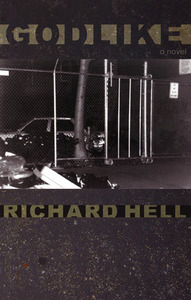Take a photo of a barcode or cover
When I first read this second novel of Hell's, at least six or seven years ago now, as I hadn't yet joined Goodreads as there's no previous review here, I really, really loved and admired it. I was blown away in fact that Hell had written such an amazing book. On a second reading, however, I found it a tad less astonishing. I think part of my admiration the first time came from lower expectations: Hell's first novel Go Now is great for what it is, but is pretty much what you'd expect from the witty, old punk rock icon--a glorified tour diary and clever tantalizingly autobiographical romp. But this novel is very different, both far more serious and literary in a way, but also just as playful and crazy--that is to say, it's smarter but in no way betrays the spirit of punk or Hell's previous musical, poetic, and autobiographical writings. It's certainly a stepping up of his game, but a tad less of an achievement, I guess than I first gave it credit for. Still, it's great and a favorite.
The novel's form is here in every review: it's a re-telling of sorts of Rimbaud and Verlaine's raucous love affair transported to 1970's New York, specifically the Lower East Side poetry scene around St. Mark's Poetry Project, as seen in retrospect from the Verlaine character's sickbed some 40 years later. Great conceit, super well handled here. Aces.
The novel's themes are poetry and sexual abandon, cleverly intertwined and explored both in the older man looking back as well as in the real time of the love affair's events--also aces. They are linked, I think, as forms of ecstatic, partially out of mind experiences, act in which we blend intellect and physicality in a search for transcendence of both, it would seem. I guess most people do that in the gym or jogging these days, but I feel there's a whole lot less intellect in sports than physicality, except perhaps in baseball. And winning is hardly the transcendence we seek in sex, drugs, or poetry.
Thus I'm at a bit of a loss to explain why the novel wasn't as astounding the second time through, except just that my expectations were raised by my first reading's surprise and the memory of loving it so much. It's hard to be surprised twice by the same thing. But I will read again, I'm sure. The narrative is so tight and so full of beauty and wisdom, I feel myself missing it as I move on to read more "normal" novels. This one is extraordinary for sure.
The novel's form is here in every review: it's a re-telling of sorts of Rimbaud and Verlaine's raucous love affair transported to 1970's New York, specifically the Lower East Side poetry scene around St. Mark's Poetry Project, as seen in retrospect from the Verlaine character's sickbed some 40 years later. Great conceit, super well handled here. Aces.
The novel's themes are poetry and sexual abandon, cleverly intertwined and explored both in the older man looking back as well as in the real time of the love affair's events--also aces. They are linked, I think, as forms of ecstatic, partially out of mind experiences, act in which we blend intellect and physicality in a search for transcendence of both, it would seem. I guess most people do that in the gym or jogging these days, but I feel there's a whole lot less intellect in sports than physicality, except perhaps in baseball. And winning is hardly the transcendence we seek in sex, drugs, or poetry.
Thus I'm at a bit of a loss to explain why the novel wasn't as astounding the second time through, except just that my expectations were raised by my first reading's surprise and the memory of loving it so much. It's hard to be surprised twice by the same thing. But I will read again, I'm sure. The narrative is so tight and so full of beauty and wisdom, I feel myself missing it as I move on to read more "normal" novels. This one is extraordinary for sure.
dark
mysterious
reflective
sad
slow-paced
Plot or Character Driven:
Character
Strong character development:
Complicated
Loveable characters:
Complicated
This was good. Really good, unfortunately. Short, poignant, and straightforward, a literary treat with its use of poetry and confusing narrative.
I enjoyed it, but I'm so glad I'm not a man.
i dont like poetry and i hate books about poets. that being said, the characters in this book had enough self loathing that i could jump on the hate boat and feel better about myself
Another punk turned poet and author, Hell was most famous for his song "Blank Generation" with the Voidoids. His work offers a curious modern updating of several literary traditions that inspired his life. "Go Now" corrupts the Beat spirit of Kerouac and Clellon Holmes, while "Godlike" re-imagines the life of Rimbaud and Verlaine as gay New York poets on acid, all the while retaining a grasp on the frailness or pointlessness of humanity.

